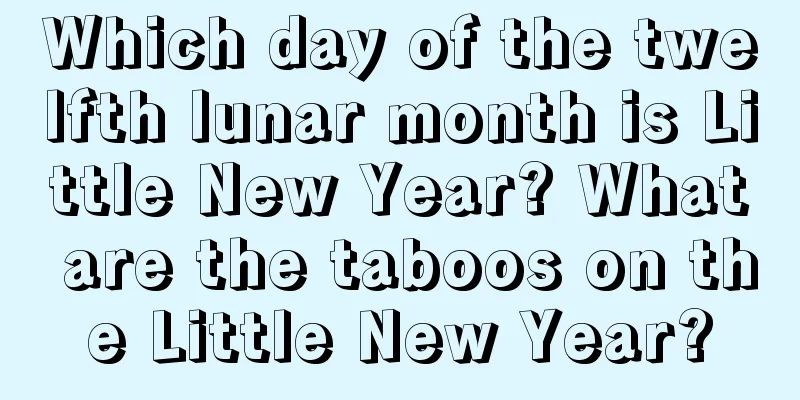Analyzing the Jingzhe folk custom of "eating fried insects". Do you dare to eat it?

|
Introduction: Jingzhe is the third solar term in the 24 solar terms of the lunar calendar, marking the beginning of mid-spring. During the Jingzhe season, the weather warms up, spring thunder begins to sound, awakening insects hibernating underground. Did you know that there is a traditional custom during Jingzhe called "eating fried insects"? Let’s take a look at it together below! The second month of the lunar calendar tells the stories of every day in February, bringing you the do's and don'ts of every day in February, as well as the directions of the God of Wealth and the God of Happiness, etc., making you full of expectations. During the Jingzhe Festival, thunder roars and all insects are startled and flee from the soil and holes. Then, ants and insects begin to move around, gradually spreading throughout fields and homes, causing damage to crops or disturbing people's lives. Therefore, during the Jingzhe period, people in different places have different insect-killing rituals. For example, the Tujia people in Hubei have a folk "Shooting Insects Day". Before the Waking of Insects, they draw the shape of a bow and arrow in the fields to simulate the ritual of shooting insects. Another example is the "Insect Sweeping Festival" during the Jingzhe Festival in Ningbo, Zhejiang Province, where farmers hold brooms and go to the fields to perform a witchcraft ceremony to sweep away all pests. In folk customs, a broom can sweep away everything, such as demons and ghosts, souls, diseases, bad luck, and pests. In the old days, during funerals, people would hang a broom behind the coffin to sweep away the soul so that the deceased would not leave its soul behind. When encountering insect pests, every household in the Jiangsu and Zhejiang areas would stick brooms between the fields to ask the broom god to help eliminate the pests. The Hakka people use the method of "frying insects" to achieve the utilitarian purpose of repelling insects. On the day of Jingzhe, the Hakka people in the ancient Tingzhou area of western Fujian would boil taro with the skin on in hot water, or fry beans or rice. People believe that this can kill many kinds of small insects, hence the saying "fry insects and fry beasts, kill insects and boil beasts". Jingzhe is the time when hibernating insects begin to revive, so the Hakka ancestors advocated early insect control. On the Waking of Insects Day, the Hakka people in Tingzhou have the custom of making taro cakes or taro dumplings. Taro symbolizes "caterpillars" and eating taro means getting rid of all insects. In Shangyou and Chongyi areas in southern Jiangxi, as well as the Hakka people in Suichuan, Ji'an, on the morning of the Waking of Insects, farmers take a small handful of grain seeds, bean seeds, pumpkin seeds, sunflower seeds and various vegetable seeds, put them into a pan and dry-fry them, which is called "fried insects". After frying, share it with your own or neighboring children. It is said that this can ensure a good harvest of grains and prevent pests. Summary: After reading the introduction in the above article, do you have a deeper understanding of the Jingzhe solar term? The 24 solar terms are my country’s fifth greatest invention, and everyone should learn more about them! You have finished reading this article. For more exciting content, please check out the special topic of the second month of the lunar calendar! |
>>: What are the traditional food customs during Jingzhe? Seven delicious delicacies you can’t miss!
Recommend
Is the eighth day of the tenth lunar month in 2021 suitable for caesarean section? Is the hexagram a good sign?
The tenth month of the lunar calendar has arrived ...
Is Mother's Day 2017 a good day? Are there any do's and don'ts we should pay attention to?
Introduction: Every year is filled with colorful d...
Query of auspicious days for bed installation in May of the lunar calendar in 2022
The fifth month of the lunar calendar is also know...
Is it okay to get married on the 30th day of the sixth lunar month in 2017? Can I get engaged and get a marriage certificate?
1. What day is the 30th day of the sixth lunar mo...
When is the beginning of summer in 2021? What to do on the day?
Lixia is the 7th solar term in the 24 solar terms ...
Is it a good idea to hold the funeral on June 17th of the lunar calendar in 2021? What are the taboos at funerals?
The most common burial method in China is "bu...
How to maintain health during the Grain Rain solar term? Is there any way?
Grain Rain is the last season of spring. The humid...
A list of auspicious and inauspicious times during the Spring Equinox in 2019!
What are the auspiciousness and inauspiciousness o...
Is it unlucky to move house the day before Xiaoxue in 2020? 2020 moving tiankeng orientation table
Introduction: According to our traditional customs...
People born on the Cold Clothes Festival are called Tiantai? What is the fate of those born on Cold Clothes Festival in 2020?
People born on the Cold Clothes Festival are calle...
Can I get married on December 25th of the lunar calendar in 2018?
In the twelfth month of the lunar calendar, the c...
How is the fate of a baby boy born on the fourth day of the tenth lunar month in 2022? Check the auspicious time of birth
The fate of a baby boy born at different times is ...
Is someone born on the ninth day of the fourth lunar month in 2019 a Taurus? Analysis of the personality of Taurus boys!
Introduction: People born on different days belong...
Why is the Autumnal Equinox set? Is it not advisable to move house the day before the Autumnal Equinox in 2020?
Introduction: The Autumnal Equinox is one of the i...
Why do we eat dumplings on the fifth day of the first lunar month? The reason for eating dumplings on the fifth day of the first lunar month
There is a custom of eating dumplings on the fifth...









